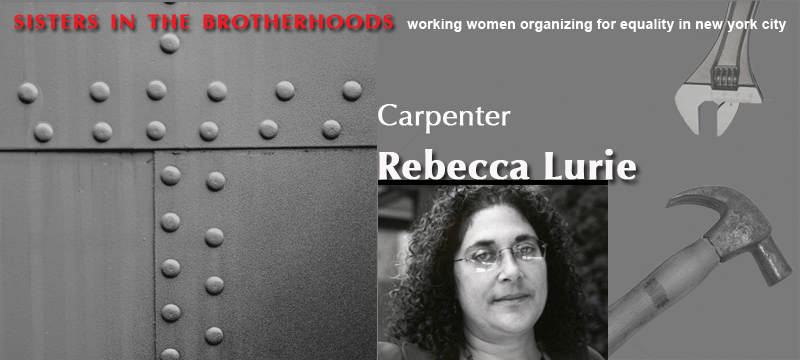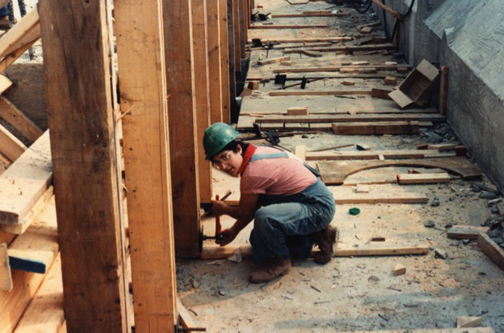 |
||||||
|
||||||
|
Rebecca Lurie's story begins in upstate New York, where her interest in alternative energy led to her work on a building project. A self-described hippie with a B.A. in sociology, she learned her carpentry skills on jobs with small contractors and also by working solo.
Lurie describes the experience of making mistakes on the job and discovering the book Against the Grain, written by pioneering carpenter Dale McCormick. It offered a common-sense approach to gaining competency. Lurie took a phrase from the book that became her mantra: "A good carpenter knows how to fix her mistakes." In her struggle to adjust to what she calls "an alien culture," Lurie adopted the strategy of educating herself by continuing to work. She also found resources in the library and visited hardware stores, asking questions and acquiring knowledge. She also learned how to handle difficult situations. Sometimes she changed jobs; at other times she focused on a problem's humorous aspect and turned it around. She entered the carpenters' union apprenticeship program and after several years moved back to New York City. She joined a local there and continued her apprenticeship education. She took a union job with the city (DC 37 job) as a full mechanic working at the main branch of the New York Public Library. She eventually rejoined carpenters' union and worked in the field as a mechanic. Beginning in 1988, Lurie taught one night a week at the carpenters' school. In 1992 she joined the staff of Nontraditional Employment for Women (NEW) as a part-time instructor. After two years at NEW, she became a full-time counselor at the carpenters' school, where she worked with students and managed its pre-apprenticeship program. Lurie was one of the volunteers who went to Nicaragua to help people rebuild houses destroyed by Hurricane Mitch in 1998. While there she met Evan Ruderman and Margarita Suarez. In 2000 the Consortium for Worker Education (CWE) hired Lurie to direct a pre-apprenticeship program for the building trades. CWE is a nonprofit education and training consortium of 46 major unions affiliated with the New York Central Labor Council. The consortium's training center provides instruction as a route from vocational school into the union's apprenticeship program. The union-backed program—Construction Skills 2000—has enjoyed consistent success and support by providing pre-apprenticeship training for teenagers, mostly black and Latino, from New York City public schools. CWE also runs the Artisan Baking Center, a bakers training program, in partnership with the Bakers' Union. Lurie maintains her union book and actively contributes to the Women Carpenters' Committee. She enjoys working with people and is gratified when her work can blend with policy to make more work opportunities for the traditionally underserved. Lurie's oral history details her creative approach to learning her trade and her commitment to helping the next generation of women and men enter the skilled trades. |
|||||
| ||||||
Copyright 2012 Jane LaTour/Talking History Lurie photo (top) by Gary Schoichet |
||||||
